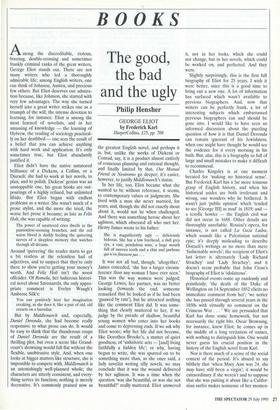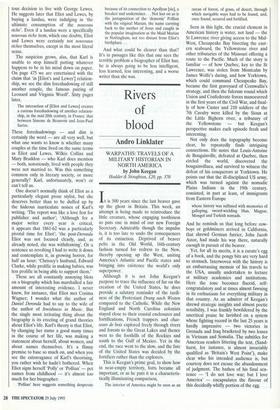BOOKS
The good, the bad and the ugly
Philip Hensher
GEORGE ELIOT by Frederick Karl HarperCollins, £25, pp. 708 Among the discreditable, riotous, boozing, double-crossing and sometimes frankly criminal ranks of the great writers, George Eliot stands out. There are not many writers who led a thoroughly admirable life; among English writers, one can think of Johnson, Austen, and precious few others. But Eliot deserves our admira- tion because, like Johnson, she started with very few advantages. The way she turned herself into a great writer strikes one as a triumph of the will; the intense devotion to learning, for instance. Eliot is among the most learned of novelists, and in her amassing of knowledge — the learning of Hebrew, the reading of sociology practical- ly on her deathbed — one sees the result of a belief that you can achieve anything with hard work and application. It's only sometimes true, but Eliot abundantly justified it.
Eliot didn't have the native untutored brilliance of a Dickens, a Collins, or a Disraeli; she had to work at her novels, to plan, and to polish. Dickens' genius was an unstoppable one, his great books are out- pourings of a highly refined, but unlimited libido. But Eliot began with endless problems as a writer. She wasn't much of a prose stylist, and the more she tried, the worse her prose it became; as late as Felix Holt, she was capable of writing:
The power of unuttered cries dwells in the passionless-seeming branches, and the red warm blood is darkly feeding the quivering nerves of a sleepless memory that watches through all dreams.
Around 'quivering' the reader starts to get a bit restless at the relentless hail of adjectives, and to suspect that they're only there to show you're getting your money's worth. And Felix Holt isn't the worst offender. Of Romola, her ludicrous histori- cal novel about Savonarola, the only appro- priate comment is Evelyn Waugh's Ambrose Silk's:
You can positively hear her imagination creaking, as she does it, like a pair of old, old corsets on a harridan.
But by Middlemarch and, especially, Daniel Deronda, she had become really responsive to what prose can do. It would be easy to think that the thunderous coups of Daniel Deronda are the result of a thrilling plot, but even a scene like Grand- court's drowning would fall flat without the flexible, unobtrusive style. And, when one looks at bigger matters like structure, she is impossible to compete with. Middlemarch is an astonishingly well-planned whole; the characters are utterly consistent, and every- thing serves its function; nothing is merely decorative. It's commonly praised now as the greatest English novel, and perhaps it is, but, unlike the works of Dickens or Conrad, say, it is a product almost entirely of conscious planning and rational thought, and finally limited by that. Our Mutual Friend or Nostromo go deeper; it's easier, however, to justify Middlemarch's status.
In her life, too, Eliot became what she wanted to be without reference, it seems, to contemporary values or judgments. She lived with a man she never married, for years, and, though she did not exactly shout about it, would not lie when challenged. And there was something heroic about her ugliness, which obsessed all who met her. Henry James wrote to his father:
She is magnificently ugly — deliciously hideous. She has a low forehead, a dull grey eye, a vast, pendulous nose, a huge mouth full of uneven teeth and a chin and jawbone
qui n'en finesseni pas . . .
It was not all bad, though; 'altogether,' James conceded, 'she has a larger circum- ference than any woman I have ever seen.' This was the way women were judged; George Lewes, her partner, was no better looking (towards the end, someone remarked that he looked as if he had been `gnawed by rats'), but he attracted nothing like the comment Eliot did. It was some- thing that clearly mattered to her, if we judge by the parade of shallow, beautiful young women who enter into her books and come to depressing ends. If we ask why Eliot wrote; why her life did not become, like Dorothea Brooke's, a matter of quiet goodness, of `unhistoric acts — [and] living faithfully a hidden life'; or why, having begun to write, she was spurred on to be something more than, as she once said, a lady novelist writing silly novels, we may conclude that it was the wound delivered by her ugliness. It was a time when the question 'was she beautiful, or was she not beautiful?' really mattered. Eliot answered it, not in her looks, which she could not change, but in her novels, which could be worked on, and perfected. And they were.
Slightly surprisingly, this is the first full biography of Eliot for 25 years. I wish it were better, since this is a good time to bring out a new one. A lot of information has surfaced which wasn't available to previous biographers. And, now that writers can be perfectly frank, a lot of interesting subjects which embarrassed previous biographers can and should be gone into. I would like to have seen an informed discussion about the puzzling question of how it is that Daniel Deronda can remain ignorant of his Jewishness, when one might have thought he would see the evidence for it every morning in his bath. But, alas, this is a biography so full of large and small mistakes to make it difficult to recommend.
Charles Kingsley is at one moment berated for 'making no historical sense'. But Frederick Karl has a far more tenuous grasp of English history, and when his historical asides are both irrelevant and wrong, one wonders why he bothered. It wasn't just 'public opinion' which 'tended to see [George III] as mad' in 1819; and a terrific howler — the English civil war did not occur in 1688. Other details are thoroughly unreliable. Rossini's opera, for instance, is not called La Gaza Ladra, which sounds like a Palestinian national epic; it's deeply misleading to describe Disraeli's writings as no more than mere `fashionable novels'; the recipient of Eliot's last letter is alternately 'Lady Richard Strachey' and 'Lady Strachey'; and it doesn't seem probable that John Cross's biography of Eliot is 'idolatrous'.
Historical events come up randomly and pointlessly; 'the death of the Duke of Wellington on 14 September 1852 elicits no immediate comment from her'; 'we notice she has passed through several years in the 1850s with virtually no comment on the Crimean War . . . ' We are persuaded that Karl has done some homework, but not necessarily the right bits. Oscar Browning, for instance, knew Eliot; he comes up in the middle of a long recitation of names, with nothing to distinguish him. One would never guess his crucial position in the history of the English novel from Karl.
Nor is there much of a sense of the social context of the period. It's absurd to say blithely that 'when Mary Ann was 24, she may have still been a virgin'; it would be extraordinary if she weren't and to suppose that she was putting it about like a Califor- nian surfer makes nonsense of her momen- tous decision to live with George Lewes. He suggests later that Eliot and Lewes, by buying a landau, were indulging in 'the ultimate consumption of the nouveau riche'. Even if a landau were a specifically nouveau riche item, which one doubts, Eliot and Lewes were certainly not nouveaux riches themselves, except in the most literal sense.
The suspicion grows, alas, that Karl is unable to stop himself putting whatever happens to be in his mind down on paper. On page 475 we are entertained with the claim that 'in [Eliot's and Lewes'] relation- ship, we see the dim foreshadowing of still another couple, the famous pairing of Leonard and Virginia Woolf . Sixty pages later,
The interaction of [Eliot and Lewes] creates a curious foreshadowing of another relation- ship, in the mid-20th century, in France: that between Simone de Beauvoir and Jean-Paul Sartre.
These foreshadowings — and dim is certainly the word — are all very well, but what one wants to know is whether many couples at the time lived on the same terms as Eliot and Lewes. Wilkie Collins and Mary Braddon — who Karl does mention — both, notoriously, lived with people they were not married to. Was this something common only in literary society, or more generally? Karl, unfortunately, won't or can't tell us.
One doesn't normally think of Eliot as a particularly elegant prose stylist, but she deserves better than to be duffed up by the hideous inarticulate noises of Karl's writing. 'The report was like a love fest for publisher and author'; 'Although for a major writer every year is critical, it appears that 1861-62 was a particularly pivotal time for Eliot'; 'the post-Deronda Eliot was not focused clearly, and, as already noted, she was withdrawing'. Or a sentence so revolting I had to write it down and contemplate it, in growing horror, for half an hour: `Chrissey's husband, Edward Clarke, while prolific in making babies, was less prolific in being able to support them.'
These are all constantly annoying blots on a biography which has marshalled a fair amount of interesting evidence. I never knew, for instance, that Eliot met Cosima Wagner; I wonder what the author of Daniel Deronda had to say to the wife of the author of Jewishness in Music. But the single most irritating thing about the biography is its erecting of grand theories about Eliot's life. Karl's theory is that Eliot, by changing her name a good many times in the course of her life, was making a statement about herself, about women, and about names themselves. It's a flimsy premise to base so much on, and when you see the extravagance of Karl's theorising, you rather wish he hadn't bothered. When Eliot signs herself 'Polly' or Pollian' — pet names from childhood — it's almost too much for her biographer:
`Pollian' here suggests something desperate because of its connection to Apollyan [sic], a breaker and underminer. .. Not lost on us is the juxtaposition of the 'demonic' Pollian with the virginal Marian, the name carrying back to the mother of Jesus and caught in the popular imagination as the Maid Marian in Nottingham, not too distant from Eliot's birthplace.. .
And what could be clearer than that? It's in passages like this that one sees the terrible problem a biographer of Eliot has; he is always going to be less intelligent, less learned, less interesting, and a worse writer than she was.



















































 Previous page
Previous page